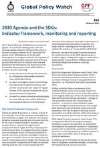Published on Thu, 2016-03-24 10:44
Freedom of association is an enabling right that underpins inclusive development. The social movements that have flooded the streets of the Arab Spring have the potential to democratize the state and secure democratic transition. However, what Europe calls "Southern Neighbouring" countries are recording alarming shrinking space for civil society, violations of freedom of association and peaceful assembly, coupled with restrictions of the right to access to information and challenges in mobilizing financial resources. |
Published on Wed, 2016-03-23 00:00
Fiscal policy—that is the raising and spending of public resources—is one of the most important structural policies which determines the degree to which a State can ensure human rights for all, without discrimination. As evidenced in the first-ever thematic audience on fiscal policy and human rights held by the Inter-American Commission on Human Rights (IACHR) this past October, who pays for what public services, and who truly benefits, are fundamental questions at the heart of any efforts to protect democracy and realize human rights. Why is tax and fiscal policy essential to realizing economic, social, cultural and environmental human rights (ESCER) in the United States? |
Published on Fri, 2016-03-18 12:50
On 11 March 2016 the UN Statistical Commission agreed “as a practical starting point” with the proposed global indicator framework by which to measure progress towards the 17 goals and 169 targets of the 2030 Agenda for Sustainable Development. It recognized that the development of a robust and high quality indicator framework is a process that will need to continue over time and authorized the Interagency and Expert Group for Sustainable Development Goals (IAEG-SDGs) to continue its work |
Published on Thu, 2016-03-17 20:23
The two-day UNCTAD expert meeting (16-17 March) on investment, innovation and entrepreneurship will be taking stock of recent developments in investment policy at the national, bilateral, regional and multilateral levels, in particular reform efforts related to the International Investment Agreements (IIA) regime. According to UNCTAD, the Multi-Year Expert Meeting on Investment, Innovation and Entrepreneurship for Productive Capacity-Building and Sustainable Development will also address policy perspectives with regards to science, technology and innovation (STI) and provide an update on entrepreneurship policies, in the context of the Sustainable Development Goals (SDGs). |
Published on Thu, 2016-03-17 19:36
The days leading to the adjournment of the Philippine National Congress every three years have always been an uneventful political time. At about this time, Congress is a picture of empty chairs and half-lit hallways as most legislators would have already been prematurely campaigning for their re-election or that of a family members’ new election bid rather than burdening themselves with attending sessions. |
SUSCRIBE TO OUR NEWSLETTER






